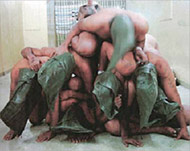Cheerleader excuse for Iraq abuse
A lawyer representing one of the alleged ringleaders in the Iraq prison abuse scandal has said piling naked prisoners into pyramids was comparable to cheerleader shows.

Charles Graner’s lawyer, Guy Womack, told the 10-member US military jury at the Texas court martial on Monday that leashing detainees was also an acceptable prisoner control.
In opening arguments at the reservist sergeant’s trial in Fort Hood, Womack asked: “Don’t cheerleaders all over America form pyramids six to eight times a year. Is that torture?”
Graner and Private Lynndie England, with whom he fathered a child and who is also facing a court martial, became the faces of the Abu Ghraib prison scandal after they appeared in photographs that showed degraded, naked prisoners.
The trial is expected to last at least a week. The 36-year-old faces up to 17 years in prison. He has pleaded not guilty.
But four of seven accused members of Graner’s unit have already pleaded guilty to abuse charges and three have been sentenced to prison.
Court martial debate
The prosecution showed some of those pictures in their opening argument, including several of naked Iraqi men piled on each other and another of England holding a crawling naked Iraqi man on a leash.
 |
|
Graner’s lawyer compared this to |
Womack said using a tether was a valid method of controlling detainees, especially those who might be soiled with faeces.
“You’re keeping control of them. A tether is a valid control to be used in corrections,” he said. “In Texas we’d lasso them and drag them out of there.”
He compared the leash to parents who place tethers on their toddlers while walking in shopping malls.
Bigger picture
However, pictures of the humiliating treatment of the prisoners at the Abu Ghraib prison outside Baghdad prompted outrage around the world and further eroded the credibility of the US, already damaged in many countries by the 2003 Iraq invasion.
The Bush administration has said the actions were those of a small group and were not part of a policy or condoned by senior officers.
But investigations have shown many prisoners in Iraq, Afghanistan and at the US navy base at Guantanamo Bay in Cuba also suffered abusive treatment after the government considered ways to obtain information in its “war against terror”.